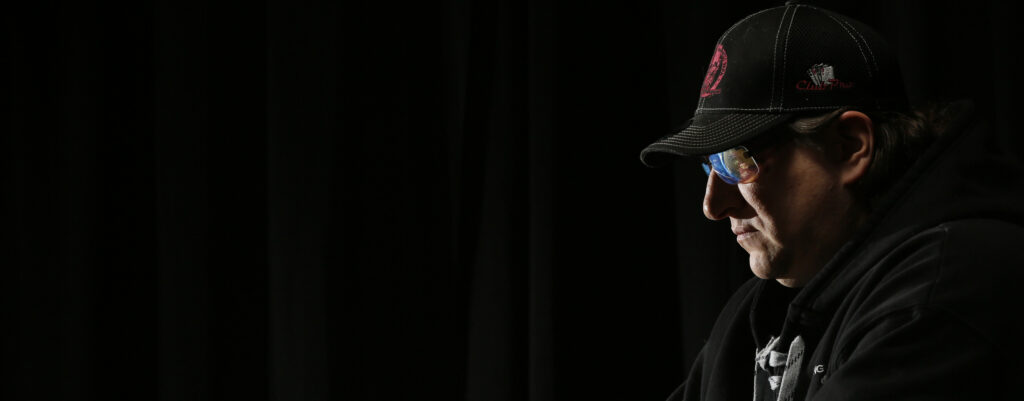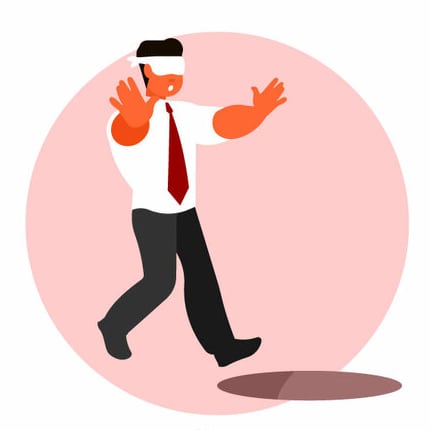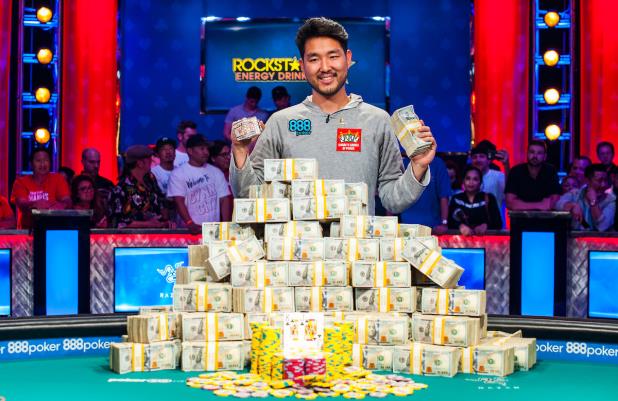Don’t Give It Away

Written by: Chris ‘Fox’ Wallace. If you’d like to read more articles like this, go to patreon.com/checkitdown
Poker is a social game. Most people think they play for money or for competition, but almost all of them actually play for the social interaction. And humans are very social animals. Even that jerk at your table who seems antisocial has chosen to sit at a table full of people instead of sitting home on his computer.
It’s the social nature of both poker, and of humans, that makes it so hard to conceal information at the tables. And if you are giving away information of any kind, someone will use it against you. I read recently about a hacking scheme where programmers were able to read the flashing of the lights on a computer through the window and eventually determine the password to log in to the machine. Even information leaks you would never have imagined can lead to someone gaining an advantage over you.
This, the inaugural Hand Of The Week, henceforth referred to as HOTW, serves as a cautionary tale about giving away any information.
I was playing $8/16 Omaha/8 at The Orleans while waiting for a bigger game to start, and the player to my left was a sharp older guy. Nice guy, chatty and friendly too. For those of you unfamiliar with Omaha/8, all you need to know for this hand is that the pot is split between the best high hand and the best low hand as long as the low hand contains at least five unpaired cards that are eight or lower.
I raised under the gun with AA88 rainbow, which is not nearly as strong a hand as you might think if you are a holdem player. Those aces don’t hold up to win the pot very often, and when they do they often only get half. It’s a raising hand, but not a monster.
The guy to my left, we’ll call him Barry because I don’t remember his name and he looked like a Barry, called. The button and the big blind also called, so the pot was already around $70 when we saw the flop.
The flop was the As Tc 7s. Yahoo, top set! But hold on, there are a lot of ways I can lose a big pot here. And any low card probably means I will only get half. I still have to bet it, I definitely have the nuts right now. I bet and Barry and the button both called while the big blind folded. Barry took a second, while the button called instantly. To me that usually means the button has 23 and is drawing to the best low hand but doesn’t want to put in a raise when he is only drawing to half the pot.
Before the turn card, Barry said “Give me a big card,” and I believed him. He wasn’t the type to call for a card he didn’t want. The turn card was indeed the Qd. I checked, he bet, and the button and I both called. Barry’s bet was confident and instant after I checked. He definitely had the broadway straight now. I only called because I had a lot of outs to a full house and if my full house came in there would be no low and I would win the whole pot. The button called instantly again, further confirmation that he was on a low draw.
The river was the 6s. No full house for me. But I realized that I still had a chance. If I checked, and Barry checked, it meant that he didn’t have a flush. Most of the time he wouldn’t have a flush. And the button would bet his nut low since it seemed obvious that Barry and I were fighting over the high side.
This gave me a chance to pull off something called a “promo raise” which is so named because you use it to promote your hand from second best to the best hand by getting a better hand to fold so you can get half the pot. If I raised, Barry was going to be faced with calling $32 cold, and with that third spade out there it would be a tough call.
My story made sense. I had flopped something with a spade draw, and had bet it. Now that I hit my spade draw and had the nuts, I wanted to extract as much money as possible, so I check-raised. It felt believable to me, and I knew this wasn’t Barry’s first rodeo. He knew the game, and ninety-nine times out of a hundred, when he saw this much action on the river, someone was going to show him the nut flush.
Barry thought for a minute, and I wondered if I had picked the wrong target. Sometimes lower limit players just can’t fold. Heck, sometimes people can’t fold even at the nosebleed stakes. If he called I had just wasted $32. He shook his head, said “Has to be spades,” and folded. When I showed my three aces for high, and the button showed a nut low, Barry put his hands on his head.
He was sharp enough to know exactly what had happened and why. Some of the players were confused, but not Barry. He had been hoodwinked and he knew it. He wasn’t used to seeing plates like this at an $8/16 game. He smiled, said “Well played,” and started a conversation with me.
Without Barry making it obvious with his words and the speed of his actions, along with the instant calls from the button, I never could have made this play. I had to be quite certain what their hands were if I was going to put in two big bets to try to win half a pot. And I also had to be fairly sure that Barry could fold, because many 8/16 players can’t.
Barry isn’t playing with his life savings. He doesn’t have to care about the money in an $8/16 game. And he isn’t really at the table for the money. He’s there to chat with people, to engage in an activity with others in a city where he doesn’t know anyone (he was passing through on his way to a national park). Poker is perfect for that. For a nice guy like Barry, who likes to talk, a poker table is perfect when you are in Vegas with no plans.
It’s fine to be Barry. But make sure you know when you’re doing it. Make sure that you know that some of your opponents are paying attention and will use any information you give away against you. Treat your opponents like my lawyer tells me to treat the police. Give them nothing, don’t talk to them, and don’t answer their questions. Because anything you say can be used against you on the river.
If you’d like to read more articles like this, go to patreon.com/checkitdown, where Chris ‘Fox’ Wallace writes every week.




Responses